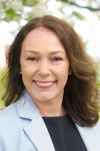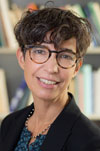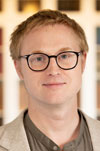Researchers

Christina Garsten, Professor, Principal of SCAS
Principal Investigator
E-mail: christina.garsten@swedishcollegium.se
The project Global Foresight aims to explore future foresight practices
in selected organizations
to gain a deeper understanding of the cultura
l rationalities and knowledge that underpin scenarios
and models for
future governance. The project recognizes that scenarios for the
future
have the
power to shape perceptions of global problems and solutions, influence organizational
agendas,
and impact decision-making and resource allocation. They are, in other words,
potentially
performative. By uncovering the underlying assumptions in these endeavors, the project
aims to con-
tribute
to the social sciences and humanities.
Within the project, Garsten focuses on examining anticipatory governance initiatives and fore-
casting
in think tanks. The objective is to understand the types of knowledge and scenario-building
templates
used in envisioning the future. Garsten investigates the technologies and tools employed,
such as
ethnographic research, metric data sets, expert workshops, online games, and digital visua-
lizations,
which help make potential futures more tangible. The project seeks to analyze the cultural
assumptions
and rationalities involved in creating and implementing these tools, the knowledge that
establishes their
legitimacy, and how they contribute to shaping future forms of governance.
Christina Garsten is a Professor of Social Anthropology, Chair of the Executive Board of Score and
the Principal of the Swedish Collegium for Advanced Study (SCAS). Her research interests center
around new forms of transnational governance, with a specific focus on the role of think tanks in
shaping governance. Previous research explored organizational culture and its transnational dynamics,
as well as organizational visions and practices related to transparency, accountability, and corporate
social responsibility. Garsten has also studied policy changes in the labor market and forms of sociality
in organizations. She holds various positions in academic and editorial boards and have affiliations with
several prestigious institutions worldwide.

Adrienne Sörbom, Associate Professor
Researcher
E-mail: adrienne.sorbom@score.su.se
Adrienne Sörbom’s research investigates anticipatory governance practices
in think tanks, research
institutes, and NGOs. The focus is on understanding
the knowledge and
scenario-building techniques
used to envision the future,
including ethnographic research, data sets,
workshops, online games,
and
visualizations. It seeks to
uncover the cultural assumptions, rationalities,
and forms of knowledge
underlying these practices and their impact on future and contemporary governance. Key questions
revolve around the types of foresight models created, the professionals involved,
the social practices
surrounding these models, and the role of organizational context. Sörbom conducts
ethnographic
fieldwork, including participant observation and qualitative interviews, to gather insights.
Adrienne Sörbom is Professor of Sociology at Södertörn University and researcher at Score, Stock-
holm University’s multi-disciplinary research center. Her research interests encompass contemporary
politics, globalization, social movements, and the intersection of politics and individualization.

Mark Maguire, Professor
Researcher
E-mail: mark.h.maguire@nuim.ie
Mark Maguire is interested in how the threatening near future is perceived,
conceived and lived by
security ‘experts’, from those working in security
agencies and institutions to those operating in
broader
networks. Within
Global Foresight, he is exploring the ways in which the future is secured
in major
critical infrastructure sites such as transport hubs and is especially interested in ethnographic
and other
detailed accounts of space and time factors in counter-terrorism training. As part of his
pro-
ject, Mark is
working with colleagues in the security sector to explore the first ten minutes of terrorist
attacks, in order to understand human behaviour and better prepare the public for the future.
Mark Maguire is Professor and Head of the Maynooth University Department of Anthropology. He
researches different aspects of security, from new technologies and their deployments to terrorist
threats and counterterrorism approaches. He is author of several books on migration. He is a convener
of The Anthropology of Security Network, a former editor of Social Anthropology, and he twice held
visiting professorships in Stanford University, California.

Mikkel Flyverbom, Professor
Researcher
E-mail: mfl.ikl@cbs.dk
Within Global Foresight, Mikkel Flyverbom’s research explores how digital
technologies and ‘big data’ condition particular forms of knowledge in the
context of anticipatory governance. Through empirical
research, he investi-
gates how digital, data-saturated organizations engage in future foresight
activities
and attempt to shape global governance efforts.
Mikkel Flyverbom is Professor of Communication and Digital Transformations at the Copenhagen
Business
School, Denmark. His research focuses on digital transformations, internet governance,
transparency, and
sociological questions about big data. In various projects and publications, he has
explored how digital technologies shape communication and governance processes in organizational
settings. More specifically, he is
interested in how organizations engage with digital transformations,
such as ‘big data’ and internet infrastructures that unsettle established ways of working and thinking.
While he has a background in communication, his work also draws on insights from organization and
management studies and sociology.
Research Assistant

Ulrik Jennische, PhD
E-mail: ulrik.jennische@score.su.se
Ulrik Jennische, in collaboration with Adrienne Sörbom, is conducting an
analysis of UNESCO and its
Futures Literacy, FL, project. This initiative,
which began in 2012, brings together futurists, researchers,
and consultants
to enhance people’s capacity to ‘use the future.’ By deconstructing future
images and
their dependence on our anticipatory systems, FL aims to empower
individuals to perceive alternatives
and make informed decisions in the present. The research utilizes
ethnographic data and documents to
examine the FL program’s key assumptions and its intended role a
nd impact at UNESCO. It seeks to
comprehend the social forces driving development and the program's
intended remedies for local and
global social challenges. Additionally, Jennische, along with Christina
Garsten, is investigating the significance of training and teaching futures thinking in the futures industry.
With a background in social
anthropology and political science, Jennische is a researcher at the Stock-
holm Centre for Organizational
Studies and also teaches anthropology courses at Stockholm University.
In the academic year 2023-24
he is a Junior Fellow-in-residence in the Global Horizons Fellowship Pro-
gramme at the Swedish Collegium for Advanced Study.
Photo credits: Stewen Quigley (Garsten); Danish Saroee (Sörbom); Mikael Wallerstedt (Jennische)
